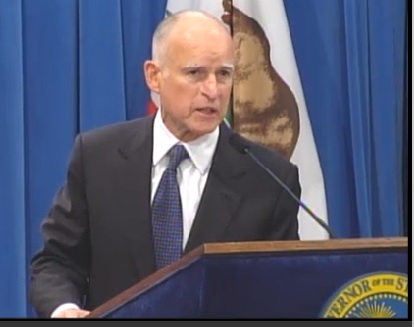

Louis Freedberg
In his State of the State speech on Wednesday, Gov. Jerry Brown made it clear again where he thinks the action should be when it comes to school reform – at the local level.
Instead of “prescriptive commands issued from headquarters here in Sacramento,” he said, the school funding reforms he and the Legislature have put in place “set more general goals” that “put responsibility where it should be” – in the classroom and school. “There is no way the state can micromanage teaching and learning in all the schools from El Centro to Eureka and we shouldn’t even try,” he said.
By stressing local control, Brown continues to try to move California away from the fundamental top-down dynamic of school reform over the past decade and half – in which schools were required to implement sweeping reforms mandated by Washington (the 2002 No Child Left Behind law), and before that by Sacramento (the 1999 Public Schools Accountability Act).
He referred to the more than 300 people who showed up at the State Board of Education meeting last week to testify before the board adopted emergency regulations implementing the Local Control Funding Formula. “That shows interest and real commitment,” he said. But he said, “their work is just beginning.”
“Each local district now has to put into practice what the local funding formula has made possible,” he said. That, together with the new Common Core standards for math and English will be a major challenge for teachers and local administrators, but they are the ones that can make it work, and I have every confidence that they will.”
Drawing on the Oxford English Dictionary, Brown also put forward his clearest definition of subsidiarity to date — that “central authority should have a subsidiary function, performing only those tasks which cannot be performed effectively at a more immediate or local level.”
With greater decison-making power over state funds, It will now be up to local school districts to demonstrate just how effective they will be.
Louis Freedberg is the executive director of EdSource. Contact him and follow him on Twitter @louisfr. Sign up here for a no-cost online subscription to EdSource Today for reports from the largest education reporting team in California.
To get more reports like this one, click here to sign up for EdSource’s no-cost daily email on latest developments in education.


Don 9 years ago9 years ago
Sorry for the typos.
Don 9 years ago9 years ago
If Brown is so interested in local control, why did he push CCSS which is a nationalization of standards despite the name to the contrary? I'm for local control, but by that I mean control at the school level where the services are delivered. Here's the biggest problem with LCFF; base grants will be handed out by pupil count to districts, but districts are not obligated in turn to hand out the base grant in equal measure … Read More
If Brown is so interested in local control, why did he push CCSS which is a nationalization of standards despite the name to the contrary?
I’m for local control, but by that I mean control at the school level where the services are delivered.
Here’s the biggest problem with LCFF; base grants will be handed out by pupil count to districts, but districts are not obligated in turn to hand out the base grant in equal measure to every counted pupil. That is to say, districts like San Francisco Unified, which are hell-bent on funding some select schools to the detriment of others, will be free to use base grants to fund schools in the fashion they please. And it anyone believes that the community has any control over the leadership, they only need to see how the teacher’s union has a lock on the Board of Education.
Prior to LCFF but after the flexibility legislation SB X3_4 of 2009, Margaret Weston of the California Public Policy Institute raised the issue of the proper roll of flexed funding. Once categorical monies were untethered from their formerly restricted application, they then in effect became general revenue, as she said in effect, and as such were put into the UGF, at least for the most part. Therefore, this money should be subject to the constitutional requirements of Serrano and distributed on a per pupil basis.
Jump forward to LCFF and what we see now are 88% of total education monies applied as base grants and apportioned to districts to spend as they please. Sure, I can go down to the board meeting an make a public comment about every child get their fair share, but does anybody really believe that local control will result in a grassroots education renewal when boards operate on the basis of changing demographic achievement trends?
What we have a transfer of power from one board to another, but the same constituencies are making all the decisions.
Richard Moore 9 years ago9 years ago
Yes, because local control has given us the lowest reading levels in the US. No standards for school libraries! What a great job, Sacramento.